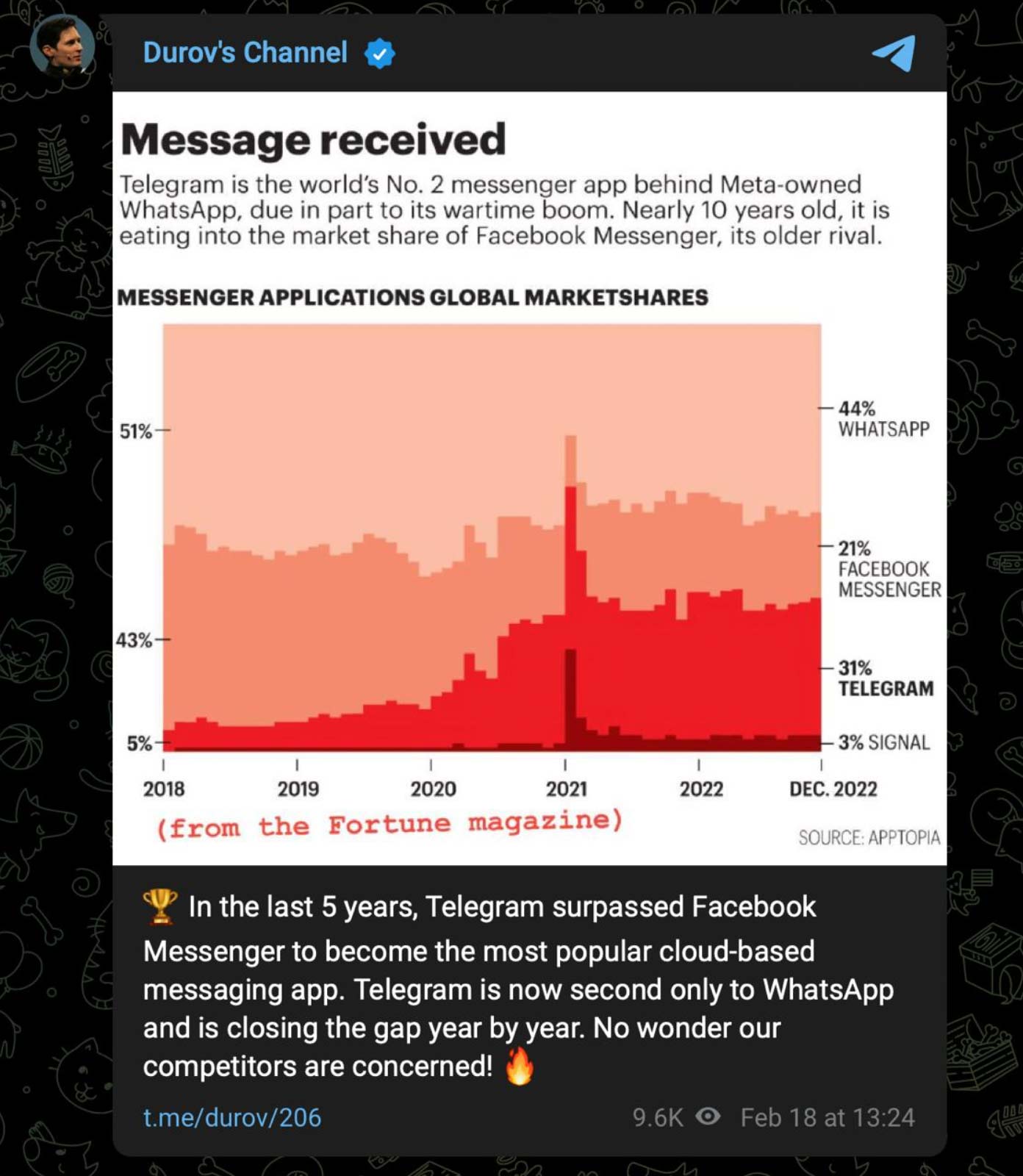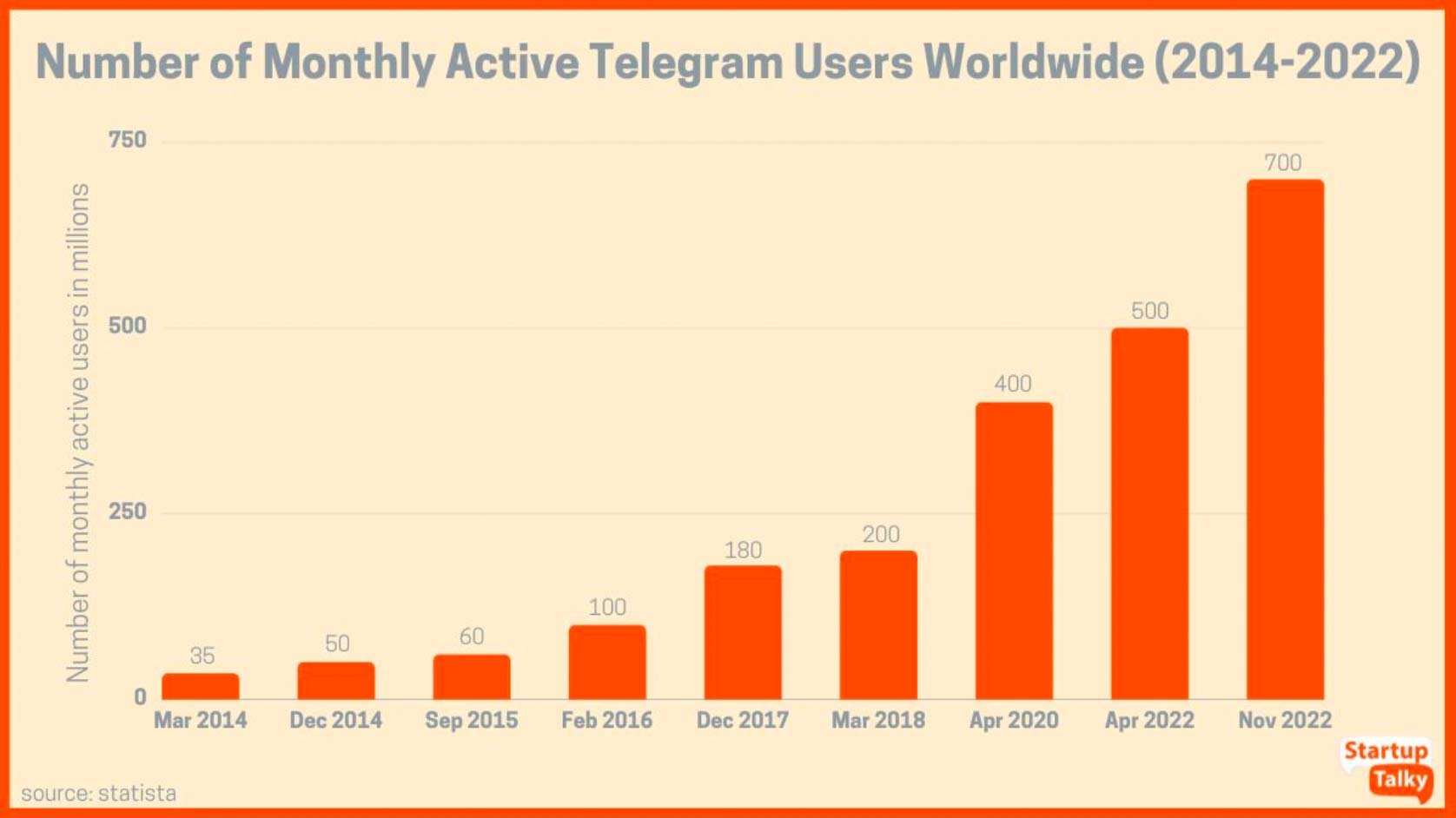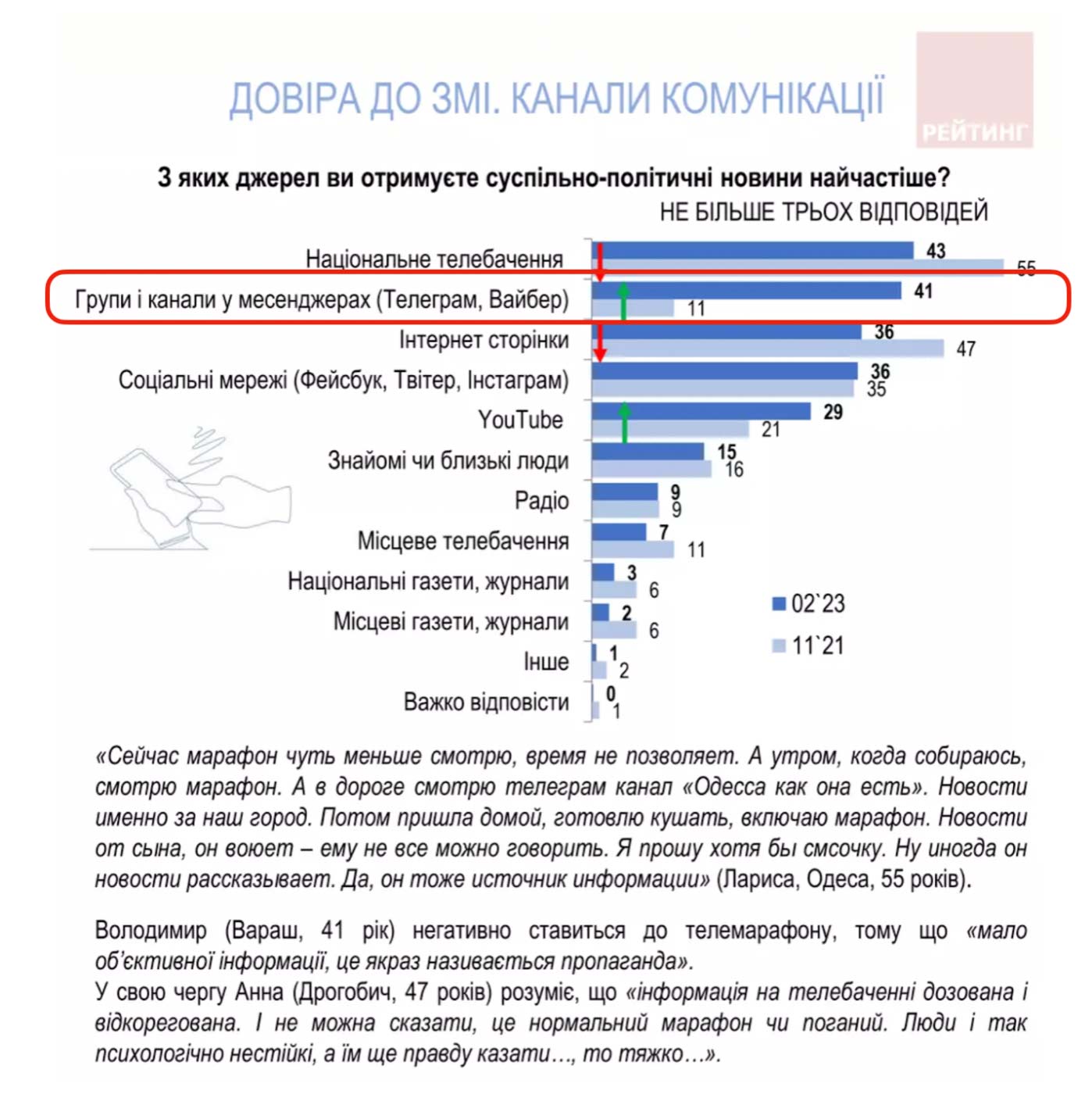Yaroslav Azhniuk , Ukrainian entrepreneur, founder and CEO of Petcube, partner and co-founder of fuelfinance, wrote in his blog on Ukrainska Pravda about what to do with the popular Telegram messenger. We are publishing it in full.
Almost every day there is more news about restrictions on TikTok in Europe and the United States.
Against this backdrop, the silence in the Ukrainian information space regarding Telegram is deafening. No, I’m not calling for it to be banned immediately, as was once (quite correctly) done with VKontakte.
But it’s time to at least start talking seriously about the risks of Telegram, especially when it’s installed on the phones of civil servants and the military.
Everyone knows that Telegram was created by Russian Pavel Durov and his team.
Behind the façade of Durov’s public statements about “independence” and “opposition to the Russian authorities” are lesser-known facts that point to Durov’s cooperation with the Russian regime.
Did you know that on June 18, 2020, after several years of attempts to block Telegram in Russia, RosKomNadzor unblocked the popular app with a comment that it was made possible by “an agreement with Durov and his willingness to fight terrorism and extremism”?
And on June 30, 2021, Putin cited Telegram as an example of constructive cooperation between the government and the social network.
Once again, Putin praises Telegram for its cooperation with the Russian authorities in the fight against extremism. Obviously, their definition of such a struggle includes everything from kidnapping Ukrainian children and striking the Mariupol theater to smearing poison on Navalny’s underwear and using radioactive weapons against the Skripals in the UK.
Do you still read Telegram channels? Read this text for more facts that make your hair stand on end and your hands reach out to find an alternative to the Russian messenger.
Recently, the Russian messenger became the second largest messaging service in the world, with a market share of 31%, overtaking Facebook Messenger and second only to WhatsApp.

As of November 2022, Telegram was used by more than 700 million people worldwide, which is twice as many as Twitter users. Its growth rate is impressive.

Meanwhile, a recent study by the Rating Group dated February 21, 2023, shows that over the past 15 months, the share of Ukrainians who receive socio-political news from Telegram channels has increased from 11% to an impressive 41%.
We see that Telegram channels have now actually caught up with television, whose share has fallen from 55% to 43% over the same period.

The unprepared reader will say: “What’s the big deal? Let the FSB read my correspondence and know what channels I subscribe to.”
Another cohort will start to object: “There is no alternative to Telegram, it is the most convenient messaging and news service.”
In both cases, it will be useful to recall the words of Laocoon – “Timeo Danaos et dona ferentes” (I fear the Danites, even when they bring gifts). This is how a Trojan priest warned his countrymen when they were given the Trojan Horse. As we know, they did not listen to him then.
It is not for nothing that the Europeans have obliged all officials to remove Chinese TikTok from their phones. Mobile apps with access to cameras, microphones, and locations are complex systems, and despite the efforts of Apple and Android, no one can guarantee that these apps will not be used for spying.
First and most obviously, Ukrainian officials and the military. From the public Telegram channels of Zelensky and Yermak to the popular Trukha channel, to the fact that some people still correspond on there about business. Nowhere at the state level do we talk about the risks posed by the Russian app.
For example, in private, most military personnel and officials use Signal or WhatsApp, but they also have the Telegram app installed on their phones and computers.
Are the risks of Telegram worth the ephemeral gain in convenience when comparing messaging on Signal or posting and reading news on Twitter?
As a society, we must start this discussion and search for alternatives. The right decisions often come with some discomfort.

Pavel Durov at the TechCrunch Disrupt conference
Someone will say: “If the FSB were reading Telegram, we would have found out about this long ago.” On the contrary, if the enemy has such a valuable intelligence resource, it will hide its capabilities by all possible means.
However, there are signals of unauthorized access to Telegram messages, and we’ll talk about that below.
Let’s talk about you and me, “ordinary citizens” whose correspondence about how many eggs to buy at the store is “allowed to be read” by the FSB.
It’s not that simple, because today, algorithms and artificial intelligence allow us to analyze the correspondence of all 700+ million users and do a lot of interesting things with this data.
For example, to identify Ukrainians whose posts contain discussions of military events, to capture changes in mass feelings and tones of conversation over time.
Such information, for example, can be used for targeted, time-targeted information and psychological special operations, popularly known as IPSO, which reinforce moods or narratives favorable to the enemy.
Again, if we are talking about the military or volunteers, it is an elementary task to algorithmically find people who are texting about a certain area or certain weapons, because Telegram stores all messages on its servers in unencrypted form.
But even with regard to supposedly encrypted “secret” chats, there were examples of unauthorized access. However, I hope that there are almost no such crazy people in Ukraine, and that the military and volunteers use only Signal and WhatsApp for such discussions.
Is it possible to access messages via Signal and WhatsApp using the Telegram application installed on the same phone? Probably so. Although this is a much more difficult and expensive task. In addition, the attackers must know the target exactly. But that’s why European and American regulators require not just “not using” the TikTok app, but not having it installed on any of their devices.
In addition, each of us, by using the network, makes it more valuable for each subsequent user – a phenomenon known as the “network effect.”
Why are you on Telegram but not on Signal or Twitter? Because most of your friends are there. Why are your parents and the chat room at home on Viber? For the same reason-because everyone does it, because it’s the way things are. The greater the network effects, the harder it is to change these habits.
However, we also have positive experience with the ban on VKontakte and Odnoklassniki. From it, we know that finding a replacement is not an impossible task.
Finally, let’s briefly go over the reasons why Telegram cannot be trusted.
- Telegram and its founder, Durov, are praised and trusted by Putin and the Russian government in the “fight against extremism and terrorism.”
- Telegram messages are unencrypted, unlike WhatsApp and Signal, and are stored on the company’s servers as plain text that can be read by both humans and algorithms
- The company’s sources of funding are suspect.
By mid-2022, it was not earning any money and the costs of servers and the team, which at that time could have reached $2 billion, were allegedly covered by Pavel Durov personally. The funds he raised in 2018-2021 came, in particular, from Russian oligarchs, including Yakobashvili, Abramovich, Usmanov, and VTB Bank. I told Yuri Fedorenko more about this in a recent mvp #4 Telegram on the FSB service. - There are cases of potential FSB access to the correspondence of Russian opposition activists [for more details, see the recent Wired article:“The Kremlin Has Entered the Chat“] and Ukrainian prisoners of war. In private conversations, Russian anti-Putin oppositionists also say that no one in their circle trusts Telegram.
- There have been several cases of Telegram transferring user data to governments, including data on anti-vaccinationists in 2022 to the German government, as well as in India, and data on users who distributed pirated versions of training courses[source: Wired].
- Telegram has blocked the Smart Voting channel of Russian opposition politician Alexei Navalny. This happened on September 18, 2021, during the elections held on September 17-19. The smart voting telegram bot gave recommendations to users on who to vote for at each polling station to minimize the number of pro-government winners in the elections of people’s representatives at all levels.
- Durov actively cooperated with the FSB back in the days of Vkontakte, which he also founded.
According to Novaya Gazeta ( an allegedly anti-Putin Russian media outlet whose director won the Nobel Prize in 2021, but which is also criticized for being “conveniently oppositional” to the likes of Venediktov and Ekho Moskvy). This is evidenced by correspondence obtained by Novaya Gazeta between Durov and Surkov, then deputy head of Putin’s administration. Surkov is also known as one of the ideologues of the attack on Ukraine and the creation of the so-called Novorossiya. In a correspondence dated December 2011, shortly after the first rallies on Bolotnaya Square, Durov wrote:
“As you know, we have been cooperating with the FSB and the K Department of the Ministry of Internal Affairs for several years now, promptly providing information about thousands of users of our network in the form of IP addresses, mobile phone numbers and other information necessary for their identification.”
In the letter to Surkov, Durov defends the idea that VKontakte communities should not be blocked, as this will only lead to an outflow of users to American platforms, which neither Durov nor Surkov control. As we can see, Surkov seems to have listened to the proposed approach.
“Blocking opposition communities on VKontakte will undermine the credibility of our network among passionate young people, which in the long run could negate our technological and ideological efforts to curb the onslaught of foreign social networks in the domestic market <…> will only lead to a serious competitive advantage for the Americans, which will result in a loss of control on our part“.
This list can go on for a long time.
***
Do I expect everyone who reads this article to immediately delete Telegram from their phones and computers? It is unlikely to happen. The power of habit is a great thing. But here’s what you can do right now:
- Think about what alternatives you could use for messaging, group chats, and news?
- Initiate the transfer of correspondence with friends, family, and colleagues to other platforms. Not necessarily all at once, one per day.
- The next time you open a Telegram channel, think about whether you could get similar news from another source.
- If you have a large and influential channel, think about alternative platforms and start developing them.
- Forward this article to your friends – you can even use Telegram.
Timeo Danaos et dona ferentes.


Leave a Reply